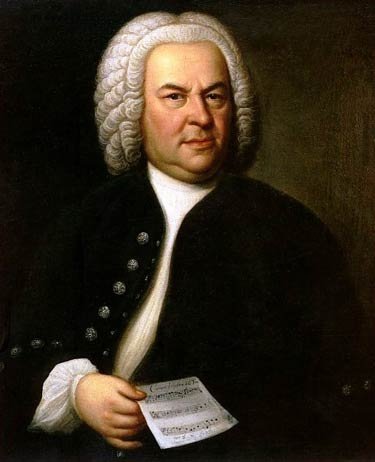This, perhaps the most famous and authentic portrait we have of J. S. Bach, was made in 1746 near the end of the composer’s life by Hausmann. Hausmann was employed as the official portrait painter of the city of Leipzig, where Bach had been living and working for more than 20 years.
Bach holds the complete, very short manuscript for a “Canon triplex a 6 voci,†that is, a triple canon for six voices. A canon is essentially a round, where the voices enter in a staggered fashion, one after the other (think “Row, Row, Row Your Boatâ€). However, in the score, only three voices are indicated (you can see that the score contains only three staves of music). This is curious, since the “a 6†designation is clearly visible in the title. Where are the other three voices?
One might assume that Bach is holding the score away from himself, pointing it toward us, so that we can read it. But look closely at his face, at his mouth. There is a visible tension at the corners—he is suppressing a grin that wants very badly to burst forth. That is because Bach knows something we do not: the other three voices, the missing ones needed to make six parts out of three, are created by simply turning the score upside down, the way Bach would be looking at it in this picture. He grins because he can see the answer right in front of him, hidden from us in plain sight, as it were. The result of combining the written materials with their inversion—combining Bach’s view of the music and ours—is a charming, cheerful, harmonious little groove loop which to me actually sounds like Bach wryly chuckling to himself. …
Bach was an extremely expressive composer, but his musical expressivity has very little to do with the kind that we encounter in Beethoven, Rachmaninoff, or even Mozart for that matter. Virtually everything in Bach’s output is an exercise in taking established procedural rules for music-making and then bending them to his own purposes, often while consciously obscuring from us the means through which he did it, with the added vexing caveat that the stuff has to sound good and be danceable. Bach’s music is onion-like in this idea of layers: not just the actual musical layers of polyphonic imitation inherent in the music itself, but in the aesthetic and philosophical layers of thought and consideration that went into his work. There is always a sense in which Bach is consciously trying (and, in my view, invariably succeeding) at being more clever than we are, at achieving iconoclasm through synthesis and sleight-of-hand rather than a more turbulent or destructive course of action. I think that this comes across in his music, whether the listener is conscious of it or not, and it is quite off-putting for some listeners. There are times when it can become trying or tiring even for me, about as big a Bachophile as you’re likely to encounter at large in the world.
Bach is a continuous stream of process, not a punctuated string of big moments. He never gives us exactly what we want; he is continuously pushing us further back from the goalpost: there is a sense in which his music is deeply human, but also a sense in which it refuses to join us on our own ground, and I think that’s a valid, if perhaps short-sighted, criticism.
Bach is about taking modest means, in terms of materials and musical rules and procedures, and generating the greatest possible variety and scope of results from them, rather like the biological world as understood through evolutionary thinking. He is a musical MacGyver, to be honest. There is something in Bach which will tend to appeal more to those who understand music as a vocation, an interest, or an occupation (in the literal sense) than to those who value music more as catharsis, release or statement. That’s not intended to be a value judgment: it’s just the nature of the music in question, I think.




